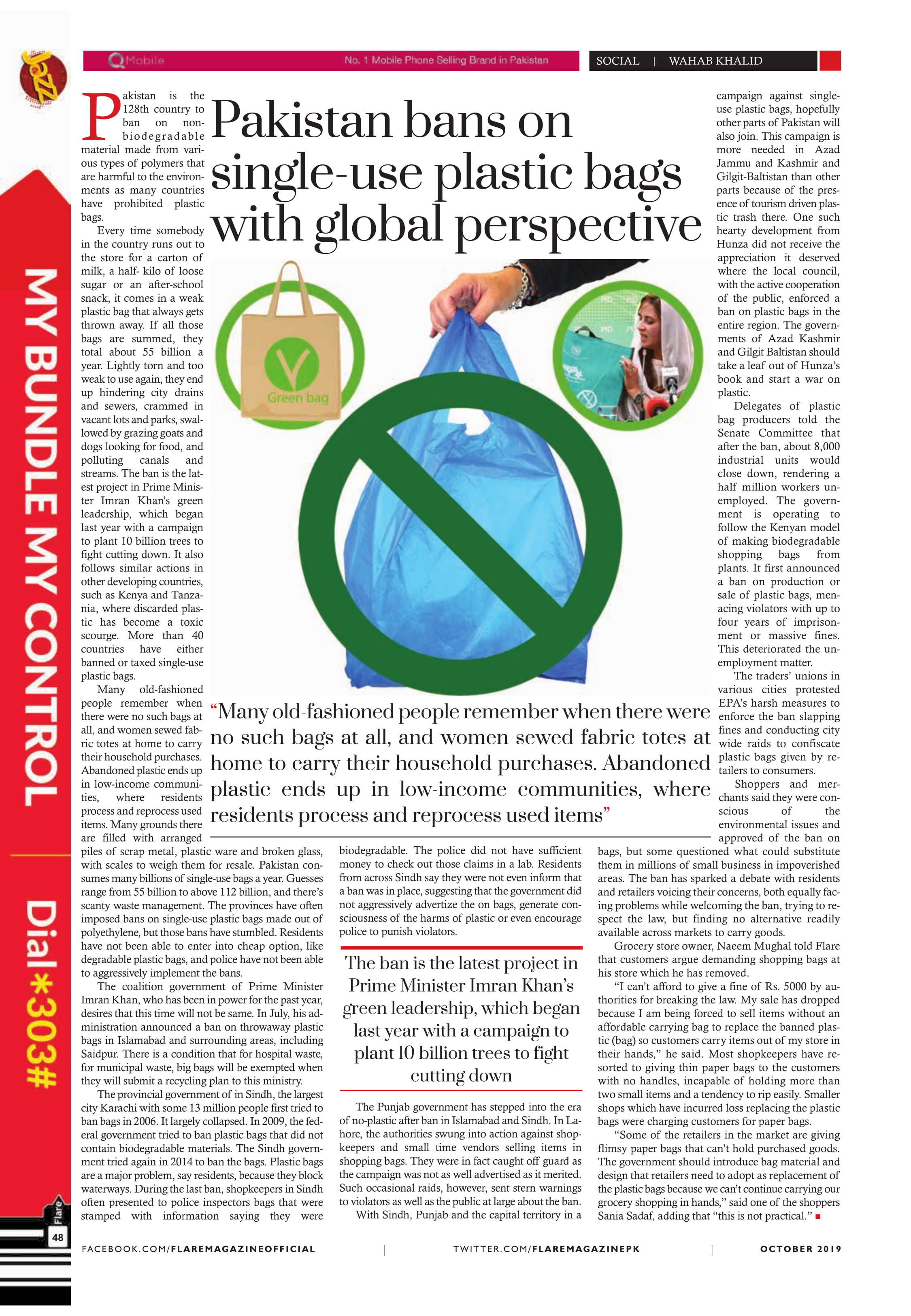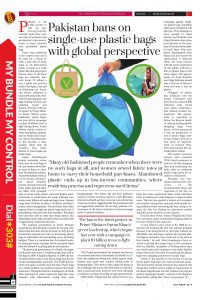
Pakistan bans on single-use plastic bags with global perspective
Many old-fashioned people remember when there were no such bags at all, and women sewed fabric totes at home to carry their household purchases. Abandoned plastic ends up in low-income communities, where residents process and reprocess used items
The ban is the latest project in Prime Minister Imran Khan’s green leadership, which began last year with a campaign to plant 10 billion trees to fight cutting down

Pakistan is the 128th country to ban on non-biodegradable material made from various types of polymers that are harmful to the environments as many countries have prohibited plastic bags.
Every time somebody in the country runs out to the store for a carton of milk, a half- kilo of loose sugar or an after-school snack, it comes in a weak plastic bag that always gets thrown away. If all those bags are summed, they total about 55 billion a year. Lightly torn and too weak to use again, they end up hindering city drains and sewers, crammed in vacant lots and parks, swallowed by grazing goats and dogs looking for food, and polluting canals and streams. The ban is the latest project in Prime Minister Imran Khan’s green leadership, which began last year with a campaign to plant 10 billion trees to fight cutting down. It also follows similar actions in other developing countries, such as Kenya and Tanzania, where discarded plastic has become a toxic scourge. More than 40 countries have either banned or taxed single-use plastic bags.
Many old-fashioned people remember when there were no such bags at all, and women sewed fabric totes at home to carry their household purchases. Abandoned plastic ends up in low-income communities, where residents process and reprocess used items. Many grounds there are filled with arranged piles of scrap metal, plastic ware and broken glass, with scales to weigh them for resale. Pakistan consumes many billions of single-use bags a year. Guesses range from 55 billion to above 112 billion, and there’s scanty waste management. The provinces have often imposed bans on single-use plastic bags made out of polyethylene, but those bans have stumbled. Residents have not been able to enter into cheap option, like degradable plastic bags, and police have not been able to aggressively implement the bans.
The coalition government of Prime Minister Imran Khan, who has been in power for the past year, desires that this time will not be same. In July, his administration announced a ban on throwaway plastic bags in Islamabad and surrounding areas, including Saidpur. There is a condition that for hospital waste, for municipal waste, big bags will be exempted when they will submit a recycling plan to this ministry.
The provincial government of in Sindh, the largest city Karachi with some 13 million people first tried to ban bags in 2006. It largely collapsed. In 2009, the federal government tried to ban plastic bags that did not contain biodegradable materials. The Sindh government tried again in 2014 to ban the bags. Plastic bags are a major problem, say residents, because they block waterways. During the last ban, shopkeepers in Sindh often presented to police inspectors bags that were stamped with information saying they were biodegradable. The police did not have sufficient money to check out those claims in a lab. Residents from across Sindh say they were not even inform that a ban was in place, suggesting that the government did not aggressively advertize the on bags, generate consciousness of the harms of plastic or even encourage police to punish violators.
The Punjab government has stepped into the era of no-plastic after ban in Islamabad and Sindh. In Lahore, the authorities swung into action against shopkeepers and small time vendors selling items in shopping bags. They were in fact caught off guard as the campaign was not as well advertised as it merited. Such occasional raids, however, sent stern warnings to violators as well as the public at large about the ban.
With Sindh, Punjab and the capital territory in a campaign against single-use plastic bags, hopefully other parts of Pakistan will also join. This campaign is more needed in Azad Jammu and Kashmir and Gilgit-Baltistan than other parts because of the presence of tourism driven plastic trash there. One such hearty development from Hunza did not receive the appreciation it deserved where the local council, with the active cooperation of the public, enforced a ban on plastic bags in the entire region. The governments of Azad Kashmir and Gilgit Baltistan should take a leaf out of Hunza’s book and start a war on plastic.
Delegates of plastic bag producers told the Senate Committee that after the ban, about 8,000 industrial units would close down, rendering a half million workers unemployed. The government is operating to follow the Kenyan model of making biodegradable shopping bags from plants. It first announced a ban on production or sale of plastic bags, menacing violators with up to four years of imprisonment or massive fines. This deteriorated the unemployment matter.
The traders’ unions in various cities protested EPA’s harsh measures to enforce the ban slapping fines and conducting city wide raids to confiscate plastic bags given by retailers to consumers.
Shoppers and merchants said they were conscious of the environmental issues and approved of the ban on bags, but some questioned what could substitute them in millions of small business in impoverished areas.
The ban has sparked a debate with residents and retailers voicing their concerns, both equally facing problems while welcoming the ban, trying to respect the law, but finding no alternative readily available across markets to carry goods.
Grocery store owner, Naeem Mughal told Flare that customers argue demanding shopping bags at his store which he has removed.
“I can’t afford to give a fine of Rs. 5000 by authorities for breaking the law. My sale has dropped because I am being forced to sell items without an affordable carrying bag to replace the banned plastic (bag) so customers carry items out of my store in their hands,” he said.
Most shopkeepers have resorted to giving thin paper bags to the customers with no handles, incapable of holding more than two small items and a tendency to rip easily. Smaller shops which have incurred loss replacing the plastic bags were charging customers for paper bags.
“Some of the retailers in the market are giving flimsy paper bags that can’t hold purchased goods. The government should introduce bag material and design that retailers need to adopt as replacement of the plastic bags because we can’t continue carrying our grocery shopping in hands,” said one of the shoppers Sania Sadaf, adding that “this is not practical.”
